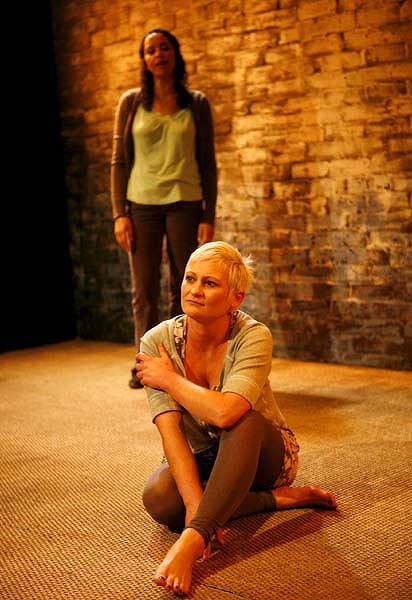 JO IS a victim of domestic violence. She never knows what will set her husband off but she cannot escape the cyclical beatings she endures.
JO IS a victim of domestic violence. She never knows what will set her husband off but she cannot escape the cyclical beatings she endures.
Next door, Jason can't stop listening through the wall. He's addicted to the noises, wracked with guilt as he imagines the horrible violent dance playing out beyond the wallpaper.
Another neighbour, Amelia, wants nothing to do with it. Her job as a lowly cleaner symbolises her ineffectual efforts to scrub Jo's battered existence out of her life. She has taken to sleeping on the downstairs couch in an attempt to prevent Jo's life seeping through the upstairs wall. Indisputably a victim, Jo wields a defiant power over Jason and Amelia.
Written in 2003, this was British playwright Debbie Tucker Green's first play. It has been labelled ''in-yer-face'' theatre, similar in tone and subject to Sarah Kane's brutally honest works. But Tucker Green's language style is different: poetic, punchy and dotted with humour within its grim subject matter. The first two-thirds of Dirty Butterfly are set in an indefinite place, a transitory world where the three characters squabble like long-time adversaries despite apparently never having met.
Despite the humiliating violence that frames her days, Jo defiantly taunts her neighbours about their collusion in her fractured life. Inaction, it is suggested, is acceptance. Tucker Green's language here is fast and real, a rhythm of broken sentences that knit together as an urban patois.
In the play's last section the action shifts to the cafe where Amelia works. The sight of a beaten and bloodied Jo turning up as Amelia mops the floor is haunting and harrowing. Jo, seemingly narrating the end of her life, is both desperate and detached. Amelia, worn down by life and Jo's repeated appearances, can only offer limited refuge as blood drips on her sparkling, just-cleaned floor.
Zoe Houghton, Dorian Nkono and Sara Zwangobani develop Jo, Jason and Amelia with precision and depth. On Teresa Negroponte's effectively economical set, Wayne Blair directs his cast and weaves Tucker Green's words into a taut, well-nurtured and absorbing production.
Facilitated a series of workshops over a 6 month period with young people whose mothers are incarcerated or have been criminalised by the justice system or themselves have experience of the youth justice system. Including drama, film and circus skills, the workshops culminated in a final showing for family and friends and a short documentary of the process.
 Facilitated a two month drama and circus program for remote Indigenous youth, aged 6- 17 . Working with the school and community to provide alternative methods of self expression and to reduce at-risk behaviours amoung young people and to educate teachers and support staff about how to harness the potential of drama and physical theatre in the classroom. Culminated in a sunset community performance of circus and drama skills.
Facilitated a two month drama and circus program for remote Indigenous youth, aged 6- 17 . Working with the school and community to provide alternative methods of self expression and to reduce at-risk behaviours amoung young people and to educate teachers and support staff about how to harness the potential of drama and physical theatre in the classroom. Culminated in a sunset community performance of circus and drama skills.
 This is a photo of me in rehearsal with Maureen Connolly, one of the members of Tin Can Theatre, which is a drama group set up with Micah Projects in South Brisbane. We're rehearsing The Keeper, a new play I've written and am directing with Sarah Hope.
This is a photo of me in rehearsal with Maureen Connolly, one of the members of Tin Can Theatre, which is a drama group set up with Micah Projects in South Brisbane. We're rehearsing The Keeper, a new play I've written and am directing with Sarah Hope.
I studied acting at NIDA in Sydney and spent five years there acting professionally. I came home to Brisbane, planning to stay for six months but two years on and I'm still here, working as a support worker for Micah, assisting people with disability and mental illness.
The Keeper is based on the participants' stories - it's giving a voice to people who often feel unheard. The title refers to how we all are custodians of our own stories and of this group's story.
We've negotiated some rocky terrain. Our participants can come with a sense of worthlessness, in the sense of "Do I have a story to tell? Is it worth hearing?" It has been the most challenging thing I've ever thrown myself into, but also one of the most
rewarding.
Like any professional ensemble, they look out for each other, and shame each other for lateness. It's been amazing.
.JANE SCOTT
THE KEEPER,
Feb 19-21, Brisbane Powerhouse, from $20, ph: 3358 8600. www. brisbanepowerhouse.org
